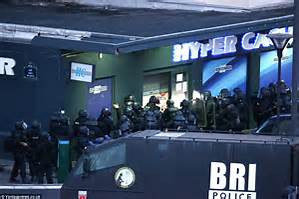A Shell Game: Washington Post Report on Anxious French Jews

“France is home to the largest Jewish community in Europe, and its most troubled. A wave of anti-Semitic violence in recent years has shaken Jews to the point where growing numbers no longer see a future here.”
So begins “Jews anxious about future in France,” by Washington Post correspondent James McAuley (May 10, 2016 print edition, May 9 online). Who is responsible for the “wave of anti-Semitic violence” and “sense of anxiety” pervading “a [Jewish] community that accounts for just 1 percent of the total French population”? The Post does not exactly say.
The newspaper does tell readers that community accounts for “nearly half of all victims of what French authorities call ‘Xenophobic’ violence.” Which “xenophobes”? In the 10th paragraph The Post finally says “Jews are struggling to consolidate safety and security in a France where radical Islamist violence has been rising.”
So, radical Muslims threaten French Jews with violence? The newspaper implies that, but stops short of saying so explicitly. Instead, it recalls:
“In 2006, there was the abduction and murder of a Jewish cell phone salesman by a gang of anti-Semitic youths. In 2012, a shooting at a Jewish school in Toulouse. In 2015, a shooting at a kosher supermarket the day after the Charlie Hebdo attack. And In January of this year, the machete attack on a Jewish teacher as he walked on the street in Marseille.”
That “gang of anti-Semitic youths” who tortured Ilan Halimi to death over a period of days while taunting his family in telephone calls was Muslims. The terrorist who murdered a teacher and three children in Toulouse in 2012 was a Muslim. The shooter who killed four Jews at Paris’ Hyper-Cacher market in 2015 was a Muslim who claimed to have coordinated with the Charlie Hebdo murderers.
But The Post quickly moves on to other matters in the last 22 of the article’s 34 paragraphs. These are the argument among French Jews over whether they should abandon France for Israel or elsewhere, or stay. And, if they stay, should they work with the anti-immigrant—essentially anti-Muslim and originally antisemitic but now ostensibly pro-Jewish National Front Party—or against it?
Early in the dispatch, a man identified as an Israeli “human rights lawyer living in Paris,” is quoted as saying “in terms of security, I don’t believe Israel is a safe place for Jews. Or for anyone else.” The Post transmits that stenographically, without context.
In context, in terms of individual security, a U.N. office reports that the murder rate per 100,000 population in Israel in 2012 was 1.8; in France (2013) 1.2; Tunisia—where some French vacation—3.1 (2012); and in the United States, where more than five million Jews live and many French visit, 3.8 (2013). (Data from most recent years posted.)
Another article by McAuley (“World Views: France plans to set up ‘anti-jihadist centers’ to curb youth radicalization,” May 10 online, not yet in print) crept a little closer to cause—Islamic extremism or Islamist supremacism—in addition to effect—rising violence against French Jews and others. The short dispatch used the words “anti-jihadist” and “jihadism” in direct quotes from the French prime minister. It also referred to “militant” and “militants” and once to the Islamic State. It also noted that “many Muslims” find state secularism “alienating.”
But those whose radicalization government officials hoped to prevent turned out to be “young men,” “young people” or “French youths.” Young Catholics? Secular youths? Young French Jews?
Unlikely.
When predominately Muslim suburbs of Paris and other French cities erupted in riots and arsons four years ago, reporting by the Tribune Newspapers (including The Los Angeles Times, Chicago Tribune and Baltimore Sun) suffered from descriptions of acts by “disaffected youths,” “rioting youths” and “gangs of youths.” Tribune Co. journalists, professionally expected to report who, what, when, where, why and how, erased the Muslim and/or North African-Arab identity of most of these “youths.” Washington Post coverage of violent threats to French Jews from radicalized Muslims suffers a similar erasure now.
More from SNAPSHOTS
Why Does a NY Times Journalist Want to Suppress an Anti-Hamas Article?
May 29, 2018
A New York Times journalist thinks the Wall Street Journal shouldn't have published an opinion piece criticizing Hamas's anti-Israel propaganda campaign. The reporter, Declan Walsh, is one of the Times reporters who has covered the [...]
Iran is Funding Hamas’s Violent ‘Protests’ at the Border, Media M.I.A.
May 22, 2018
Iran's Supreme Leader, Ayatollah Ali Khameini The Islamic Republic of Iran is behind the recent Hamas-orchestrated violent demonstrations—dubbed the “March of Return”—at the Israel-Gaza border, according to Israeli authorities. Yet many major U.S. news outlets [...]
Are Gaza Gunmen “Protesters”? NY Times Refuses to Say
May 21, 2018
After repeatedly insisting that "Israeli soldiers killed 60 protesters" during clashes last Monday, May 14, the New York Times is refusing to clarify whether its count of supposed protesters includes the eight armed Hamas fighters [...]
Bahrain Says Israel Has a Right to Self-Defense, and the Media Shrugs
May 15, 2018
Bahrain's Foreign Minister and then-U.S. Secretary of State John Kerry The foreign minister of the Arab nation of Bahrain, Sheikh Khalid al-Khaalifa declared on May 10, 2018 that Israel has a right to defend itself. [...]
AFP Captions Call Jerusalem Parade Participants Settlers
May 15, 2018
Numerous Agence France-Presse photo captions generalized all participants in Sunday's Jerusalem Flag Parade as "settlers," despite the fact that the crowd hailed from across Israel, within the Green Line, as well as outside. A sampling [...]
Journalist: Hezbollah Shows ‘More Maturity’ Than Israel
May 9, 2018
Hezbollah Secretary General Hassan Nasrallah A Los Angeles Times special correspondent, Nabih Bulos, declared on Twitter on May 7, 2018, that Hezbollah (“Party of God”) shows “more maturity” than Israel. Hezbollah is a Lebanese-based, Iranian-backed, [...]


